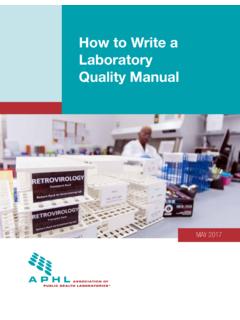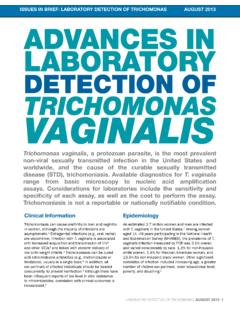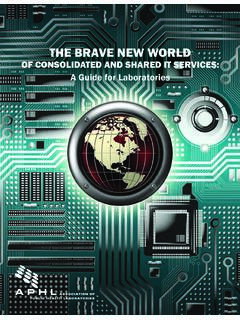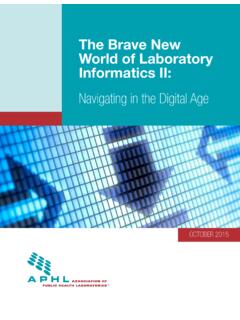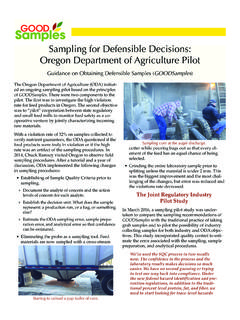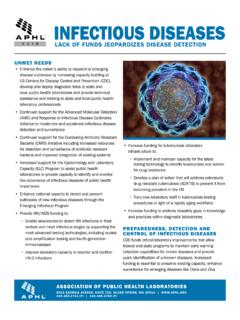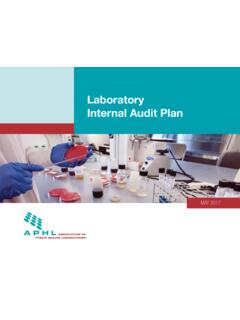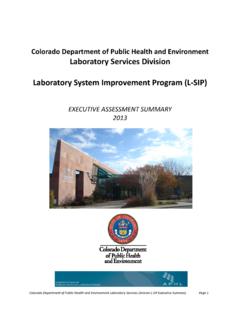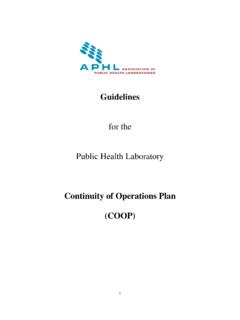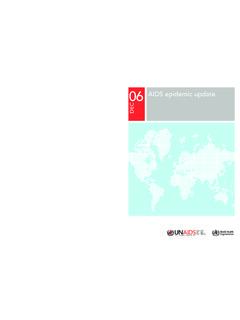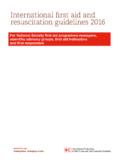Transcription of 2016 Global Health Country Update - aphl.org
1 8515 Georgia Avenue, Suite 700, Silver Spring, MD 20910 | | Association of Public Health Laboratories (APHL) is a nonprofit, nongovernmental organization with more than 800 members representing US state and local public Health , agricultural and environmental labs, US federal agencies, Health partners and interested individuals. For more than 20 years, APHL has also worked outside the US, collaborating with over 30 countries on five continents to increase Global Health security. Through close partnerships, strategic planning facilitation, training for laboratory leaders and bench staff, guidance documents and technical assistance, APHL works to strengthen laboratory-based disease surveillance, early outbreak detection and disease prevention. Much of this critical work has been possible through funding from the US President s Emergency Plan for aids Relief (PEPFAR), which strives to control and reduce the spread of HIV, and the Global Health Security Agenda (GHSA), which aims to strengthen countries capacity to prevent, detect and respond to infectious disease outbreaks.
2 This report covers APHL initiatives to support the goals of these cooperative agreements through December HEALTHCOUNTRY UPDATEACTIVITIES THROUGH DECEMBER 2016 COUNTRIES INCLUDED IN THIS REPORTPage 2 APHL Global Health Country UPDATES 2016 SPRING 2017 8515 Georgia Avenue, Suite 700, Silver Spring, MD 20910 | | PEPFARAPHL is collaborating with Angola s Ministry of Health (MOH) to strengthen national and local laboratories by improving rapid HIV testing, External Quality Assessment (EQA) proficiency, quality systems and accreditation efforts for the national laboratory system. Specifically, APHL is providing technical assistance with viral load testing and the EQA program, as well as mentorship and training on laboratory practices for MOH laboratory staff. The goal is to strengthen the national aids , tuberculosis and serology laboratories, as well as the nine smaller testing facilities located within Luanda s healthcare facilities.
3 BOTSWANA PEPFARAPHL will support the Botswana MOH and US Centers for Disease Control and Prevention s (CDC s) Botswana USA Project (BOTUSA) as they conduct a national HIV drug resistance study; APHL will provide on-site technical consultations and procure goods such as Plasma Preparation Tubes and viral load and genotyping reagents. In collaboration with BOTUSA and other partners, APHL will conduct two training sessions for nurses who will enroll study participants and collect samples. DEMOCRATIC REPUBLIC OF THE CONGO (DRC)PEPFARAPHL is planning to conduct Strengthening Laboratory Management Towards Accreditation (SLMTA) training at six DRC MOH laboratories. This three-part workshop includes targeted mentorship for participants upon completion. External audits will be arranged with the African Society for Laboratory Medicine (ASLM) and support will continue for the training of a new group of laboratories selected by APHL and CDC SLMTA, APHL is working with the labs to improve quality assurance in testing and practice.
4 APHL will provide training in CD4, viral load testing and early infant diagnosis and biosafety. In addition, APHL has finalized the curriculum for a train-the-trainer program in HIV rapid testing, which will launch later this year. Evaluation measures will include comparison of pre- and post-test results and the number of train-the-trainer participants who successfully pass competency tests. ETHIOPIA PEPFARAPHL is providing technical assistance to the Ethiopian Public Health Institute (EPHI) in the installation and implementation of a Laboratory Information System (LIS). APHL is also working with the EPHI LIS/IT team on maintenance and training plans that will be supported by the EPHI team and a local LIS vendor to ensure sustainable maintenance. Strengthening the LIS system will also strengthen the laboratory system overall, while improving laboratory results and data management and providing a more sustainable and transparent approach to LIS activities.
5 GHSAAPHL is developing a laboratory management training, which will be piloted in collaboration with EPHI, in Addis Ababa, Ethiopia in 2017. Course topics will include the following: Management 101, Planning/Monitoring & Evaluation, Human Resources, Communication, Change/Time Management, Ethics, Global Health Security and Laboratory Networks, Emergency/Incident Preparedness and Response, Biosafety/Biosecurity, Field Surveillance and Management of Infectious Diseases and Antimicrobial Resistance, Overview of Quality Management Systems (QMS), Problem Solving and Decision Making and Finance. Additionally, APHL will support procurement of supplies and equipment for the EPHI Training Center and biosafety cabinet certification trainings. Ethiopia: EPHI Bioengineers learn to take biosafety cabinet airflow measurementsStrengthening Laboratory Management Towards Accreditation. These three-part training workshops for laboratorians focus on effective laboratory practices and management to improve overall quality.
6 Targeted mentorship is provided to participants upon 3 APHL Global Health Country UPDATES 2016 SPRING 2017 8515 Georgia Avenue, Suite 700, Silver Spring, MD 20910 | | GHSAAPHL is collaborating with the MOH and CDC Guinea to Update the National Laboratory Strategic Plan and Policy in an effort to strengthen the national laboratory system. APHL is helping to upgrade the Laboratoire National de Sant Publique, the national public Health laboratory, into a full reference lab with surveillance and quality management systems. APHL s technical support and logistical assistance is increasing testing capacity for Ebola and other infectious diseases, as well as the ability to prevent, rapidly detect and effectively respond to public Health is also partnering with RESAOLAB, a West African regional laboratory network, to identify training needs and resources at RESAOLAB s new Laboratory Division training center in GHSAAPHL is collaborating with CDC India and the Indian National Centers for Disease Control to identify public Health system priorities and define the laboratory action package implementation plan.
7 Potential activities include laboratory networking and capacity mapping, biosafety cabinet certification and training, strengthening specimen referral and transport systems, and quality improvement in antimicrobial resistance detection. INDONESIA GHSA APHL hopes to partner with CDC Indonesia to support a situational assessment that will evaluate the capacity of Indonesia s public Health laboratories. This will help to identify gaps, prioritize next steps and strengthen the national capacity to support has five active priority initiatives in Kenya: LIS, viral load testing scale-up, EQA, equipment management, and mapping the national laboratory system capabilities. Two full-time APHL local IT staff support 14 provincial hospital laboratory LIS and work hand-in-hand with Kenya s MOH on capacity building initiatives to create a sustainable LIS for the Country . APHL is mentoring, training and supporting two MOH staff who will eventually take over the management of the 14 LIS installations.
8 APHL has conducted a baseline assessment of five MOH viral load testing laboratories to develop LIS requirements for the specific needs of each facility. Three laboratories were determined to require an LIS system and a new LIS is ready to go live at one facility. This new LIS will improve the turnaround time for reporting viral load data to the National aids & STI Control Program (NASCOP). APHL also supported the implementation of remote logging of samples to reduce clerical work at LIS laboratories and to expedite reporting of test results to clinicians and to has developed a database to support the National Public Health Laboratory in management of the EQA Program, following up with corrective actions and training as required. APHL has trained 129 facilities in use of the EQA system informatics and enrolled them in the EQA proficiency testing collaboration with the MOH and the National Public Health Laboratory, APHL is mapping the capabilities and capacities of laboratories in Kenya s national public Health system to meet and sustain disease outbreak response, surveillance and diagnostic services.
9 An assessment has been completed in 18 of Kenya s 47 counties, with 22 more to be assessed by March also has established a national equipment calibration center and provided training for biomedical engineers in the maintenance and calibration of key laboratory equipment. It will continue to support the center and mentor biomedical engineers in five key counties. Other APHL activities in Kenya include development of a strategic plan for the National Public Health Laboratory, procurement of laboratory equipment and supplies, and services to improve the blood establishment information system at the Kenya National Blood Transfusion Service. Kenya: Attendees at LIS transition meeting work on team-building exercisesGuinea: APHL Country lead Dr. Alpha Diallo discusses guidelines for Guinea s national public Health laboratoryPage 4 APHL Global Health Country UPDATES 2016 SPRING 2017 8515 Georgia Avenue, Suite 700, Silver Spring, MD 20910 | | has helped Sierra Leone transition from an emergency Ebola response to a system of early detection and disease prevention, the foundation of which is a strong public Health laboratory network that can meet Integrated Disease Surveillance and Response and International Health Regulation requirements.
10 Sierra Leone has taken huge leaps forward, including implementing a new National Testing Algorithm and updating its National Laboratory Strategic with CDC and the MOHS, APHL helped the CPHRL sustain its response to outbreaks while also taking on the responsibilities of an apex laboratory in a national public Health laboratory system. Investment in Sierra Leone s workforce has paid vast dividends. All 12 Public Health Laboratory Rapid Response Team members are now independently diagnosing Ebola, with 3,700 specimens tested to date; they are trained in Zika diagnosis and have supported the activation of clinical diagnostic labs at Princess Christian Maternal Hospital, Ola During Children s Hospital and Jenner Wright Children s Clinic. Many members are also trained in 12 other tests, including HIV, cholera and influenza. SOUTH SUDANPEPFARAPHL s focus in South Sudan has been to ensure a reliable power source for laboratory needs.
